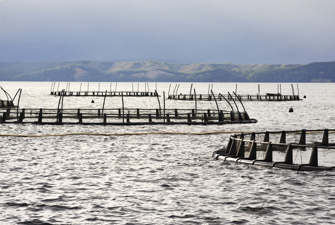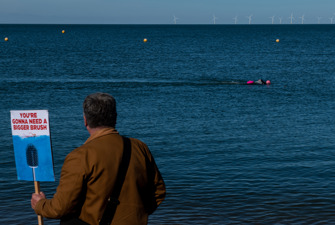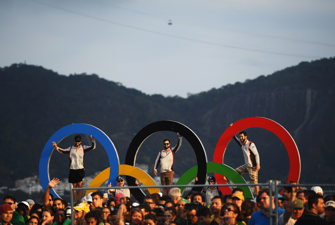Flying high: How European football clubs are exploiting fans and the environment
Despite commitments to preserve the environment, Europe's biggest football clubs travel far afield by plane to play friendlies before the season begins. Research by Play the Game reveals the extent of this travel.
The period before leagues begin in late summer is used by Europe’s mega-clubs to tour the world looking for new fans and sponsors at the expense of the environment. New research for Play the Game reveals the extent of this extensive travelling and its significant carbon footprint.
Of the 12 clubs that proposed to form a European Super League, 10 will leave Europe for preseason games and fly hundreds of thousands of kilometres to North America and Asia to play money-spinning friendlies that earn them sizeable sums and cost fans a fortune.
Table 1: Travelling this summer by Europe's biggest club for friendlies
|
Clubs |
Countries visited |
Overseas games |
|
AC Milan |
Austria, USA |
5 |
|
Arsenal |
USA |
3 |
|
Atletico Madrid |
Hong Kong, Sweden |
2 |
|
Barcelona |
USA |
3 |
|
Chelsea |
USA |
4 |
|
Inter Milan |
UK |
1 |
|
Juventus |
Germany, Sweden |
2 |
|
Liverpool |
USA |
3 |
|
Manchester City |
USA |
4 |
|
Manchester United |
Norway, USA |
4 |
|
Real Madrid |
USA |
3 |
|
Tottenham |
Japan, South Korea |
3 |
In 2018, the Relevant Sports Group paid clubs which took part in the International Champions Cup as much 3.25 million US dollars per match according to Der Spiegel which bases the number on information from Football Leaks. Summer tours can now earn clubs 10 million US dollars or more.
Since then, the value of overseas TV rights for most major European leagues has stalled in Europe and clubs are looking further afield to drive growth through playing friendlies that can cost overseas fans eye-watering sums.
This summer, half of the potential ESL clubs are playing in the Soccer Champions Tour in the USA, where a backstage tour pass can cost up to 3,540 US dollars and Meet and Greet tickets can cost up to 5,000 GBP – for a non-competitive game featuring multiple substitutions.
Flights to the US generate a huge carbon footprint that conflicts with the attempts by the clubs to present an environmentally sustainable image. Calculations by the BBC suggest that preseason travelling to the US this summer by both Chelsea and Manchester United will each generate around 200 tonnes of CO2, which is the equivalent of 500,000 miles driven by an average petrol car. This is based on travelling parties of 30 people in business class.
Match agents told Play the Game that big clubs can take more than 80 people on some tours, which can include journalists.
In August 2024, Chelsea FC and Manchester City played a preseason friendly match in Columbus, Ohio, in the USA. Photo: Darren Walsh / Getty Images.
Gap in elite football between what clubs say and do
English club Tottenham Hotspur is a signatory of the UN Sports for Climate Action Framework and recently achieved ISO 20121, which is an important international standard for sustainable event management. Yet, the club travelled further than any other member of the putative ESL this summer with visits to Japan and South Korea.
This contradiction of clubs travelling around the world in preseason has drawn criticism from environmental campaign groups, such as the Cool Down Sport for Climate Action Network.
“There is a growing gap in elite football between what clubs say they are going to do to tackle the climate crisis and their actions. When it comes to preseason friendlies, this gap is a chasm,” said the Network’s Freddie Daley, who is an academic at the University of Sussex.
“European giants flying vast distances by plane to play preseason friendlies, in shirts emblazoned with the logos of high-carbon companies, puts pressure on both players and the planet. In a carbon-constrained world, where extreme heat and floods are already pulling apart football’s infrastructures, the unerring drive for expansion must be reassessed."
“Within football and beyond it, actions speak louder than words. If elite clubs are serious about protecting their players, fans and the future of football, they need to say less and do more.”
Spurs told Play the Game that it aims to travel as sustainably as possible, saying:
“This includes minimising air travel, with team officials and delegates travelling on the team plane. During the season, the team will travel by coach for all distances under 2.5 hours, whereby player physical optimisation and performance is not compromised as a result.”
The club said it measures travel emissions to try and reduce emissions and works with Destination Sport Travel to offset emissions “where possible” by buying carbon credits verified by the UN Framework Convention on Climate Change. Play the Game asked Spurs how many people travelled with the club for overseas friendlies but did not get a reply.
A long history of preseason pollution
The carbon footprint being blazed across the planet by the proposed ESL clubs is not new. Research for Play the Game identified 653 preseason games played by the 12 ESL clubs between 2014 and 2023. 412 team involvements (63 per cent) were played overseas.
Most of this preseason travelling over the past decade has been outside of Europe, which creates a significantly larger footprint as it involves air travel. Out of 412 overseas games, 262 were played in Asia or North America, which is 40 per cent of all preseason games.
Most games in North America took place in the US where Real Madrid and Manchester United each played 24 games. That represents 56 and 45 per cent of each club’s respective preseason matches, as the two sides took part in money-spinning games aimed at growing their commercial revenue.
The organisers of the proposed ESL told Play the Game that they did not have any policies about offsetting their potential member clubs’ extensive travel in preseason.
When these clubs did play games at home, their opponents often travelled from overseas. Just 26 per cent of the preseason games played by ESL clubs over the last decade were at home and against clubs from their own country. Manchester City and Barcelona have played just seven and eight games respectively at home against British and Spanish clubs in the last decade.
In half of the last 10 preseasons, Real Madrid have not even played a game in Spain and only once in that decade has the club played another Spanish team. In 2020, COVID-19 decimated preseason arrangements and Real’s sole preseason match was against Madrid neighbours Getafe.
Preseason environmental damage
Many clubs play games in other clubs in Europe as part of training camps, whereas games further afield are invariably part of commercial arrangements aimed at increasing commercial revenue and engaging with overseas fans.
This has produced a plethora of preseason competitions that have little meaning outside of corporate boxes. Who remembers the Casinò Lugano Cup, the Chevrolet Cup or the Coupang Play Series? Yet these competitions have attracted some of Europe’s biggest clubs.
“Teams that take off around the world on big-polluting preseason tours are threatening the safety of the players and communities they ultimately rely on,” Peter Crisp from the campaign group Fossil Free Football told Play the Game.
“They are disregarding both the grave welfare concerns of overstretched players and the threat that is already posed by fossil-fuelled extreme weather."
“The dangerous ‘business as usual’ mentality and endless push for more matches must give way to governance that is realistic about the obvious physical limits of players and the planet. It is time for top clubs to show real leadership by cutting their pollution to safeguard the future of football,” said Crisp.
In 2023, Manchester City played Atletico Madrid in a preseason friendly match at Seoul World Cup Stadium in South Korea. Photo: Chung Sung-Jun / Getty Images.
Manchester City has the most extensive preseason carbon footprint
Manchester City has not been short of titles over the past decade and the club has a new one as the side with the most extensive carbon footprint generated from preseason travel.
Research for Play the Game found that more than three quarters of preseason games played by Manchester City between 2014 and last summer were played outside of Europe.
Overall, this research found 19 leading European clubs – some potential ESL members, others not – that had played 10 or more preseason games outside of the continent in the past decade. Only 30 per cent of preseason games played by these clubs were at home against clubs from their own country.
Among the 19 clubs travelling the most, 56 per cent of their overseas games were in neutral venues, like the Melbourne Cricket Ground in Australia. These showpiece games in neutral venues create an even bigger carbon footprint, as both clubs taking part have travelled from another country.
Last summer, for example, Spurs and Premier League rivals West Ham both flew more than 14,000 kilometres to Perth in Australia to play a friendly, while Manchester City played Atletico Madrid in the Coupang Play Series in the South Korean capital of Seoul, which is nearly 9,000 kilometres from the club’s home base.
Table 2: Europe's biggest travelling clubs in pre-season
| Club | Total friendlies | Overseas matches | Total outside Europe | % of all preseason games |
| Manchester City | 36 | 30 | 25 | 69 |
| Manchester United | 53 | 40 | 33 | 62 |
| Real Madrid | 43 | 38 | 26 | 60 |
| Arsenal | 51 | 33 | 23 | 45 |
| Barcelona | 47 | 29 | 20 | 43 |
| Juventus | 54 | 29 | 22 | 41 |
| Paris Saint Germain | 53 | 35 | 21 | 40 |
| Chelsea | 50 | 37 | 19 | 38 |
| Tottenham Hotspur | 45 | 29 | 17 | 38 |
| Bayern Munich | 64 | 24 | 23 | 36 |
| Liverpool | 70 | 46 | 25 | 36 |
| Atletico Madrid | 55 | 32 | 17 | 31 |
| Inter Milan | 80 | 35 | 19 | 24 |
| Sevilla | 67 | 46 | 15 | 22 |
| AC Milan | 72 | 38 | 16 | 22 |
| Roma | 69 | 38 | 15 | 22 |
| Borussia Dortmund | 65 | 27 | 14 | 22 |
| Crystal Palace | 58 | 19 | 12 | 21 |
| Newcastle Utd | 60 | 24 | 10 | 17 |
Premier League the worst offender among leagues
Not surprisingly, as the world’s richest club football competition, the English Premier League is the worst offender for extensive preseason travel.
There have been a dozen trips by Premier League clubs to Australia and New Zealand in preseason over the last decade and 230 games played outside of Europe, which is over 20 per cent of all games contested. One or more Premier League clubs travelled to Australia or New Zealand every preseason from 2014 to 2019.
Since long-haul preseason travel resumed in 2022, four clubs have been to Australia in preseason. Tottenham Hotspur even went again at the end of the 2023/24 Premier League season as did Newcastle. Both clubs used private jets.
Table 3: Europe's Big 5 Leagues in Pre-season
| League | Total friendlies | % overseas | % in neutral locations | % all games outside Europe |
| Premier League | 1.125 | 45,8 | 22,3 | 20,4 |
| La Liga | 1.339 | 39,4 | 10,7 | 8,4 |
| Serie A | 1.218 | 33,2 | 14,3 | 6,9 |
| Bundesliga | 1.244 | 31,5 | 16,0 | 4,4 |
| Ligue 1 | 1.107 | 31,2 | 7,5 | 3,0 |
French clubs play closer to home
Preseason activities by leading French clubs are likely to have the smallest environmental impact. The research found that 31 per cent of preseason games by Ligue 1 clubs are played outside France and just 3 per cent outside Europe, which is the lowest ratio amongst Europe’s Big Five leagues. French clubs often play warm-up games at smaller stadia inside France before starting league matches.
Although 39 per cent of preseason games played by Bundesliga clubs were outside Germany, many clubs play games in neighbouring Austria, where travel is often by coach rather than plane. Across the last decade, at least a dozen or more of the 18 Bundesliga clubs went to Austria every season. The exception was 2020 during the COVID-19 pandemic.
Although 39 per cent of preseason games played by Bundesliga clubs were outside Germany, many clubs play games in neighbouring Austria. Here, Arminia Bielefeld and VfB Stuttgart in a preseason friendly match at Kufstein Arena in Austria. Photo: Thomas F Starke / Getty Images
COVID-19 impacts data on travel
The data underlying this research includes the year 2020 where the impact of COVID-19 drastically reduced international travel including travel by football clubs.
In 2020, no La Liga clubs played any preseason games outside of Spain, while Liverpool’s two games in Austria were the only matches played by Premier League clubs outside of Britain. Single matches in Switzerland and Slovenia by Verona and Inter Milan were the only foreign trips by Serie A teams.
The disruptions caused by COVID-19 to preseason preparations continued for more than one season, partly due to healthcare restrictions, but also because the disruptions meant that league fixtures took longer to complete or start.
This makes the overall travelling by these clubs look less extensive than it would have been, as long-haul trips - such as West Ham’s trip to Australia in 2020 - were cancelled due to COVID-19.
In reality, the amount of games played outside of Europe is probably 10-20 per cent below what clubs would have played if COVID-19 had not occurred.
Hardly any preseason matches are played in Africa
In the summer of 1992, prior to the launch of the Premier League, 75 (44 per cent) of the 172 preseason games were played overseas, but only Crystal Palace and Sheffield Wednesday ventured outside of Europe – both to South Africa.
But while European football’s fanbase has exploded across Africa in recent decades, European teams have all but ignored its neighbour to the south.
Africa is a relatively short distance. Countries in North Africa such as Tunisia and Morocco, co-host of the 2030 FIFA World Cup with Spain and Portugal, can even be reached by boat from France, Italy and Spain. However, over the last decade just nine of more than 6,000 preseason team involvements by clubs from Europe’s Big Five leagues have been in Africa.
It makes a lie of the clubs’ mantra that preseason tours are about connecting with supporters around the world. The real motivation is collecting foreign currency.
Premier League response
As the competition with the largest number of major clubs travelling long-haul in preseason, Play the Game asked the English Premier League if it provided advice to its clubs on how to reduce their carbon footprint or offset emissions caused by extensive preseason travel.
The Premier League would not comment directly, but said there is no central mandate on travel, which is left to individual clubs to plan.
The Premier League pointed out that during the first quarter of 2022, its clubs took 59 domestic flights, which was just 0.079% of all UK domestic flights, but this travelling was to fulfil competitive matches rather than money-spinning friendlies. When Play the Game asked again for a comment on the clubs’ extensive preseason travel, the Premier League said: “We don’t have any further comment.”
In February 2024, Premier League clubs signed up to an Environmental Sustainability Commitment, which included four operational measures. These included appointing a senior club employee to develop sustainability advice, developing a ‘robust’ environmental sustainability policy by the end of the 2024/25 season and supporting a common framework for action via the Premier League Sustainability Working Group (PLSWG).
Clubs also agreed to work towards a standardised football-wide approach to measuring emissions. No date was set on this commitment but clubs did agree to produce a greenhouse gas emissions dataset (scope 1, 2 and 3) by the end of the 2025/26 season. Scope 3 would be likely to cover the environmental impact of preseason travel.
Back on the road
With health restrictions now gone, the Premier League’s clubs are back travelling én masse. Ten of the competition’s 20 clubs will go to North America, while another three teams will fly to Japan and South Korea, all with sizable parties of players, officials and backroom staff, travelling thousands of miles on jet planes.
As European football’s biggest clubs continue their relentless search for more fans, more sponsors and more money, the environment is paying the price.
Research covers first XI games played in July-September only. Games by English Premier League teams in Wales, Scotland and Northern Ireland do not count as overseas. Sources: Soccerway, Worldfootball.net, Wikipedia, club websites.
Steve Menary is the author of A Friendly Business? A Critical Evaluation of the Globalisation and Commercialisation of the Preseason Friendly (CIES, 2019).
This article was developed with the support of Journalismfund Europe.












